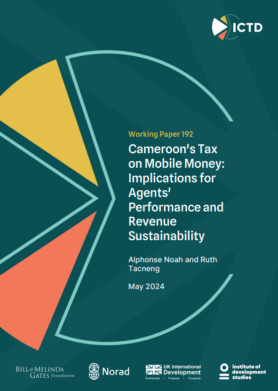Working Paper 192
Agents play a key role in making financial services more accessible, especially for those who are financially excluded. Agents act as intermediaries between mobile money account holders and mobile money service providers, helping them to register as new customers and to credit and take money out of their accounts.
In this paper, we explore how introducing a 0.2 per cent tax on mobile money transactions in Cameroon in 2022 affected the performance and revenue of agents. We mainly analyse agents’ commission and transactions using the administrative databases of those responsible for daily management of agent networks (henceforth superagents). To complement our analysis, we conducted a survey of agents in the Centre Region, asking about their business strategies after introducing the tax on mobile money.
